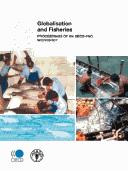| Listing 1 - 3 of 3 |
Sort by
|
Book
Year: 2016 Publisher: Frontiers Media SA
Abstract | Keywords | Export | Availability | Bookmark
 Loading...
Loading...Choose an application
- Reference Manager
- EndNote
- RefWorks (Direct export to RefWorks)
From a global perspective aquaculture is an activity related to food production with large potential for growth. Considering a continuously growing population, the efficiency and sustainability of this activity will be crucial to meet the needs of protein for human consumption in the near future. However, for continuous enhancement of the culture of both fish and shellfish there are still challenges to overcome, mostly related to the biology of the cultured species and their interaction with (increasingly changing) environmental factors. Examples of these challenges include early sexual maturation, feed meal replacement, immune response to infectious diseases and parasites, and temperature and salinity tolerance. Moreover, it is estimated that less than 10% of the total aquaculture production in the world is based on populations genetically improved by means of artificial selection. Thus, there is considerable room for implementing breeding schemes aimed at improving productive traits having significant economic impact. By far the most economically relevant trait is growth rate, which can be efficiently improved by conventional genetic selection (i.e. based on breeding values of selection candidates). However, there are other important traits that cannot be measured directly on selection candidates, such as resistance against infectious and parasitic agents and carcass quality traits (e.g. fillet yield and meat color). However, these traits can be more efficiently improved using molecular tools to assist breeding programs by means of marker-assisted selection, using a few markers explaining a high proportion of the trait variation, or genomic selection, using thousands of markers to estimate genomic breeding values. The development and implementation of new technologies applied to molecular biology and genomics, such as next-generation sequencing methods and high-throughput genotyping platforms, are allowing the rapid increase of availability of genomic resources in aquaculture species. These resources will provide powerful tools to the research community and will aid in the determination of the genetic factors involved in several biological aspects of aquaculture species. In this regard, it is important to establish discussion in terms of which strategies will be more efficient to solve the primary challenges that are affecting aquaculture systems around the world. The main objective of this Research Topic is to provide a forum to communicate recent research and implementation strategies in the use of genomics in aquaculture species with emphasis on (1) a better understanding of fish and shellfish biological processes having considerable impact on aquaculture systems; and (2) the efficient incorporation of molecular information into breeding programs to accelerate genetic progress of economically relevant traits.
genomic selection --- Next-generation sequencing --- Fish breeding --- Transcription --- selection footprints --- high-throughput genotyping --- Genetic --- Single nucleotide polymorphism
Book
ISBN: 9282781526 9789282781524 Year: 1996 Volume: *14 Publisher: Luxemburg Bureau voor officiële publicaties der Europese Gemeenschappen
Abstract | Keywords | Export | Availability | Bookmark
 Loading...
Loading...Choose an application
- Reference Manager
- EndNote
- RefWorks (Direct export to RefWorks)
5
339.92

ISBN: 9789264037779 9789264037762 9789251057698 9264037764 9786611719302 1281719307 9264037772 Year: 2007 Publisher: Paris, France : OECD,
Abstract | Keywords | Export | Availability | Bookmark
 Loading...
Loading...Choose an application
- Reference Manager
- EndNote
- RefWorks (Direct export to RefWorks)
This conference proceedings highlights the key risks and opportunities that policy makers need to address relative to fisheries globalisation so that on the one hand, the opportunities that are created are not missed while, on the other, the risks are addressed appropriately. It presents a wide range of experiences and points of view from every part of the value chain of the fisheries industry, including fishers, processors, consumers, NGOs, restaurant and retail chains, as well as government and academic experts.
Foreign trade. International trade --- Hunting. Fishery. Aquaculture --- Fisheries --- Fishery management --- Fishery policy --- Globalization --- 504.062 --- 639.2 --- 639.3 --- Fisheries policy --- Fishes --- Fishing policy --- Economic policy --- 504.062 Protection, rational use, restoration of natural resources. Sustainable development --- Protection, rational use, restoration of natural resources. Sustainable development --- 639.3 Fish breeding. Pisciculture. Aquaculture --- Fish breeding. Pisciculture. Aquaculture --- 639.2 Fishing. Fisheries --- Fishing. Fisheries --- Government policy --- Conservation --- Pêches --- Mondialisation --- Pêches, Politique des --- Congresses. --- Congrès --- Gestion
| Listing 1 - 3 of 3 |
Sort by
|

 Search
Search Feedback
Feedback About UniCat
About UniCat  Help
Help News
News